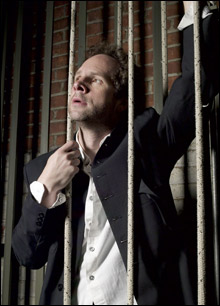
Benjamin Evett
|
It’s been two years of living Danishly for regional theaters, what with four major productions of Hamlet. The latest, by the hot young Actors’ Shakespeare Project, takes its road show to Dorchester’s Strand Theatre (through November 12). This is a space that has known more downs than ups in recent decades, and the company deserves credit for bringing Shakespeare to underserved audiences while luring tonier theatergoers to Dorchester.ASP also gets points for the way it uses the space, putting actors and audience on the Strand’s large stage. The action is wonderfully intimate — though looking out into the emptiness of the theater, one senses notes of faded glory and cosmic silence.
This Hamlet is as lucid a production as you’re going to see. Even those who felt they OD’d on the play might find themselves thinking, “Ah, that’s where Shakespeare was going with that idea,” thanks in large part to the clarity of artistic director Benjamin Evett in the title role. Still, one wants more than lucidity from what might well be the English language’s greatest play. Under the direction of New Repertory Theatre head Rick Lombardo, the production alternates between smart moves and stumbles, inspired acting and silly posing.
Evett’s Hamlet is tremendously athletic, though you probably wouldn’t want anyone older playing the part. His father (Ken Cheeseman) looks younger than he does. But all Evett’s sturm-und-dranging makes him as unlikable as he is anti-heroic and might lead a Claudius or Gertrude (or an audience member) to say, “My boy, have you thought about decaf?” Speaking of coffee: given that the show runs almost four hours, you might want to come caffeinated. And speaking of Claudius and Gertrude: Johnny Lee Davenport and Marya Lowry are the most charismatic royal couple since Kyle MacLachlan and Diane Venora in the underrated 2000 Michael Almereyda/Ethan Hawke film. Lowry makes you feel the full weight of her character’s tragedy, her queen falling from the heights of romantic optimism to the depths of a misled woman in a world gone wrong. She’s the best of the four New England Gertrudes, no mean feat given that the competition includes Karen MacDonald and Tina Packer. Davenport starts out strong but degenerates — like too much here — into bombast.
There are excellent turns from Robert Walsh as a super-bureaucratic Polonius and Marianna Bassham as a wide-eyed Ophelia. Bassham’s first-act exit, after she’s been assaulted by Evett, is magnificent. Edward O’Blenis, on the other hand, isn’t up to the company’s standards as Laertes.
Lombardo’s stagecraft, as good as it is, could populate its Heaven and Earth with more than rolling platforms and the occasional beyond-the-stage manifestation, such as the Ghost in the balcony. In a production this long, that vast emptiness in the Strand begins to look less like an indifferent universe than just empty red seats.
Evett’s best moments are the quietest. His “What is a man” soliloquy lifts the play from the prince’s self-absorption to a universal questing. If only there were more things like it in this production’s philosophy.